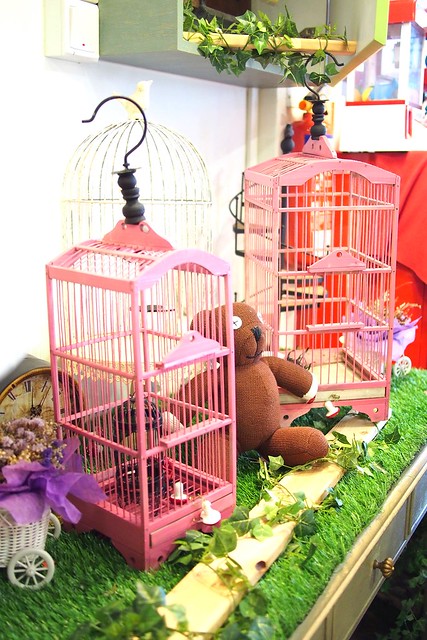We were at Hatter Street Bakery and Cafe (facebook, 212 Hougang Street 21) over the weekend.
It had a mostly Alice-in-Wonderland theme going on (with a good lashing of other cute stuff, like Mr. Bean’s bear).
I liked the little references – the circular view of the sky in the underside of the staircase, suggesting that we had already fallen down down down the rabbit hold, and the little door at the counter:

It felt like we were schoolkids at a cafe after being let out for the day.
School had been a real waste of my time. Boring slow-going lessons, and I don’t recall many of the tedious speeches we had to sit through during school assemblies and events – waffle-y stuff supposed to inspire us to make a difference in the world and be the change society needs etc.
But this one by Bilahari Kausikan is a keeper, not just because his tongue is firmly in-cheek. He extols scepticism, and not so much of authorities and received wisdom, but of self. (And then of course, scepticism of one’s scepticism, just to be, err, sure.)
Guest-of-Honour Speech at Raffles Institution’s 189th Founder’s Day
When your Principal, in a reckless act of folly, asked me to be Guest-of-Honour at this 189th Founder’s Day, my first instinct was to do us both a favour and refuse. But I hesitated and in an instant was lost. The temptation to savour the irony was too great. For what I am about to say, I absolve her of all responsibility.My comrades and I spent our six years in Raffles Institution waging insurgency against all established authority. At a very tender age one of our teachers told us we were all born to be hanged. And if that extreme did not come to pass — perhaps I should say, has not yet come to pass — several of us were at least caned. Our then Principal failed to achieve his dearest ambition of getting us all expelled only due to our dumb luck.
So here I stand before you, living testimony to the role of chance and serendipity in life; a role more often than not insufficiently acknowledged if not ignored, particularly by Singaporeans of a certain ilk…
I do not think that there is any particular meaning, pattern or direction, divine or secular, in the drift of human events. History, as Winston Churchill is reported to have remarked, is just one damned thing after another. The innocent die young and the wicked flourish; and not necessarily in equal measure either because to the wicked the innocent are often prey…
None of us asked to be born. Yet having had life thrust upon us, we must, unless bent on suicide, nevertheless live. Although we can only, if dimly and darkly, know backwards, we have to live forwards.
No one can live in a constant Hamlet-like state of existential doubt. We must profess a certainty that we do not necessarily feel…
I am sure that by now many of you are harbouring a thought that you are too well brought up to speak out loud: this idiot exaggerates…
So let me restate my essential point in a different way…Sincerity is an over-rated virtue, if indeed it is a virtue.
All of you may be suddenly seized with the sincere conviction that that pigs should fly. But pigs will nevertheless never sprout wings no matter how devoutly you hope for them to escape the surly bonds of earth.
And if you, ignoring the possibility of error, sincerely believe that pigs ought to fly; or that God’s Will has been revealed to you; or that you are one of the elect to whom the direction of History’s cunning passages has been vouchsafed, then it is but a tiny step to being convinced that anyone who does not share your conviction is not just ignorant but evil. Then for the greater glory of PIGS or HISTORY or GOD, all spelt in capital letters, it is only a tinier further step to seeing it as your bounden DUTY, again spelt with capitals, to expunge the evil…
Rather than sincerity, if we want to do some trifling and ephemeral good or at least to minimize harm, we should approach life with an ironic and humane scepticism…
I have chosen to dwell on this at what you may consider inordinate length, because Raffles Institution likes to consider itself unique. Ladies and Gentlemen, I am sorry to inform you that RI is no longer unique.
You are now only one of a number of similar elite educational institutions from which will come a disproportionate number of scholarship recipients and a disproportionate number of leaders in the civil service, the professions, business, the Arts and the academy. And all these institutions are united by a certain sense of entitlement, possibly so profound as to be quite unconscious.
I do not blame you for this. All of you are highly intelligent. You will be very well educated. And the odds are that you will be more than averagely successful in your careers.
But understand that you will therefore also be more vulnerable to the curse of the highly intelligent, highly educated and highly successful: this curse is the illusion of certainty; the conviction of the omnipotence of your ideas…
I certainly have no answers. As you, the anointed ones, ready yourselves to assume authority and responsibility under these challenging circumstances. I can do no more than to remind you of what Sir Olivier Cromwell wrote to the Synod of the Church of Scotland in 1650. He was trying to persuade the Scots not to embrace the Royalist cause of King Charles the Second and so avert civil war.
Gentlemen, he wrote, “I beseech you, in the bowels of Christ” — and I should explain that in the 17th Century the bowels were considered to be the seat of pity or the gentler emotions — Gentlemen, Cromwell wrote, “I beseech you, in the bowels of Christ, think it possible that you may be mistaken”.
So, Ladies and Gentlemen of the 21st Century, I beseech you from whatever portion of anatomy you consider most dear, think it possible that you may be mistaken.
Before I conclude, you may wish to know how it all ended.
Cromwell’s advice was not heeded. Shortly thereafter, the third English Civil War broke out. This set in motion a historical trajectory of political, social and economic changes that led to modern Britain, the industrial revolution, the East India Company, Sir Stamford Raffles, the British Empire, the founding of Singapore and ultimately, you and I.
And all because good advice fell on deaf years.
What better way to appreciate the irony and contingency of events than to ponder what may have happened if Cromwell’s advice was in fact taken and civil war avoided. And as you do so, consider also the possibility that you may be mistaken when you think you are mistaken.
And with that final paradox I will end.





